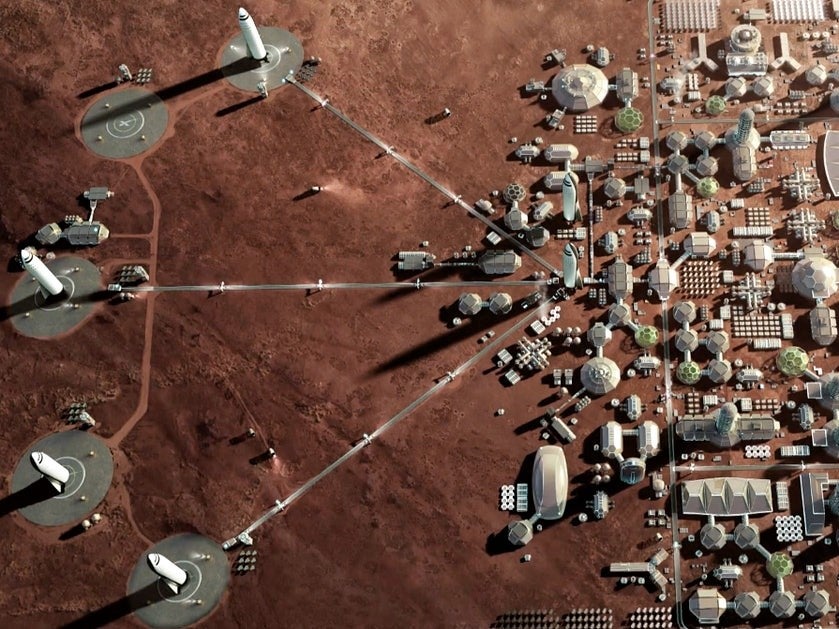Elon Musk’s most remarkable achievement – making space travel boring
Space X has launched more than 100 rockets into orbit this year already and now lands them back where they started, writes Anthony Cuthbertson. What should be extraordinary is now almost mundane – which is all part of the plan if Musk’s ambitions for space exploration are to come true

On a trip to Florida last year, no one in the shops, diners, hotels, or taxis that I spoke to knew that there was a rocket about to launch to space just a few miles down the road. Nor did anybody seem to really care. Only one lady seemed mildly interested in the news, saying she’d be sure to keep her dogs inside that evening so they wouldn’t get too scared by the noise.
In Cape Canaveral, the regularity of rocket launches – there’s one nearly every other day – means that all the excitement has been taken out of them. Most of these launches, including the one I went to see, are done by the same rocket made by the same company: SpaceX’s Falcon 9. Elon Musk’s company has launched more than 100 of them to orbit already this year, which is more than every other type of rocket launched by every other company and country around the world combined.
The Falcon 9’s success is based on its reusability. Once it launches, it returns to Earth and lands vertically on a landing pad, where it is refurbished, refilled, and launched again. No matter how many times I see the rockets land, it still looks like CGI – but it is no longer extraordinary.
What is extraordinary – at least for now – is SpaceX’s latest method for reusing rockets. Rather than land them on a pad away from the launch tower, the company’s rocket scientists have figured out how to return them directly to the launch tower by catching them with a chopstick mechanism.
SpaceX has only done it once, but it was with the biggest rocket ever built: Starship’s Super Heavy booster. Daniel Huot, a communications manager at the firm, says it’s “hands down the coolest thing I’ve ever seen, and the fact we’re going to do it every time now kind of breaks my brain a little”.
An attempt to repeat last month’s successful catch was made on Tuesday. Despite the excitement surrounding the first return of a Starship rocket, few seemed to know it was even happening. People I usually chat to about Starship – the same rocket that Musk hopes to colonise Mars with – had not even realised that there was a test launch this week.
After more than 40 million tuned in to watch SpaceX’s broadcast of October’s Starship Flight 5, only 13 million watched Starship Flight 6 on Tuesday.
Humans are naturally drawn to novelty, and even the spectacle of watching a 120-metre-tall rocket – taller than Big Ben’s tower – return to Earth with the help of some giant mechanical chopsticks will become monotonous eventually.
The British psychologist Daniel Berlyne, who spent most of his life studying human curiosity, theorised that our attention is most captivated when three variables are peaked: novelty, complexity and uncertainty.

The fact that people are losing interest in Starship launches means they are becoming commonplace, simple and reliable. If humanity wants to continue exploring the universe, this can only be a good thing.
If a rocket launch can become as mundane as a plane taking off, that opens up a whole new level of novelty. By pushing the boundaries of what’s interesting outwards, the next new thing to peak our interest will be even more extraordinary.
There are a lot of new things to look forward to when it comes to space – an infinite amount in fact. Through Starship’s involvement in Nasa’s Artemis program, it will deliver the first humans to the Moon in more than 50 years. And if Musk’s ambition of making humanity multi-planetary, then it will be Starship that makes it happen.

During the live stream of the latest test launch, SpaceX said it plans to build a new Starship “every eight hours” in order to build a massive fleet capable of ferrying crews and cargo throughout the solar system. Each ship can carry 100 people, and in Musk’s vision, these will not be highly-trained astronauts, but passengers.
On my way home from Florida, I noticed that most people – including myself – barely glanced out of the plane window as it soared 10 kilometres above the Earth. A view that has been unreachable to every human throughout history apart from the very last few generations has now been rendered unremarkable. Even the astronauts aboard the International Space Station have complained of boredom.
For those of us back on Earth, there is still a buzz in Brownsville, Texas, where the biggest rockets ever built are launching. But as this excitement begins to wane, we can now look forward to the next new thing.






Join our commenting forum
Join thought-provoking conversations, follow other Independent readers and see their replies
25Comments